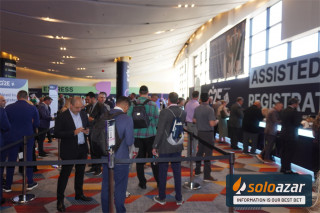Commercial restrictions by betting operators in the UK
Thursday 24 de July 2025 / 12:00
2 minutos de lectura
(London).- The Chief Executive, Andrew Rhodes, discusses the practice of commercial restrictions being applied to customer accounts by gambling operators. This follows a data request made by the Commission earlier this year to some of the largest online real-event betting providers.

The practice of bookmakers placing commercial restrictions on customers has long been a source of contention between impacted consumers and gambling operators.
As stated in the Gambling White Paper (opens in new tab), gambling operators are entitled to act in their commercial interests and manage liabilities. It is not within our regulatory remit to mandate how individual operators manage their commercial liabilities.
We do need to understand the dynamics of the market we regulate, however. As outlined in my 2024 CEO Briefing, understanding the nature and prevalence of commercial restrictions is one area where further insight on how the gambling market is functioning was required.
To this end, a data request was made in early 2025 to some of the largest online real-event betting providers. We collected data related to commercial restrictions applied to active customer accounts1 within the previous calendar year. This request covered a majority of the market – almost 15 million customer accounts – and has provided us with important data on how and when commercial restrictions are being applied to British gambling consumers.
Overview
The data provides valuable insights on the nature and prevalence of commercial restrictions imposed by those operators in the sample. It is not possible to get a full picture of how and why individual operators apply restrictions from a uniform data request. We will therefore be engaging further with the industry and others. Below are some selected headline findings from the data request.
From a total of 14,923,840 active customer accounts, operators reported 643,779 accounts restricted in some form – a rate of 4.31 per cent. This includes all forms of restrictions, and some accounts will be subject to multiple forms of restriction. It is important to note that the proportion of restricted accounts can vary significantly between operators, for a variety of reasons including individual risk appetite, operator size, and profile of customer base. We will continue to explore the extent to which these (and other) factors influence an operator’s approach to applying commercial restrictions. Additionally, it should be noted that customers will have multiple active accounts across different operators – and so account numbers should not be equated with number of people impacted.
There are several methods operators use to restrict an account; the data shows that in most cases a maximum stake factor reduction is imposed – restricting the maximum stake to a percentage amount of what is available to an unrestricted customer. Of the active accounts, 2.68 per cent were subject to a stake factor restriction. Of restricted accounts, 62.17 per cent were subject to a stake factor restriction. The data shows some operators use stake factor restrictions as their sole or overwhelmingly most common form of restriction.
The second most common form of restriction was account closures, with 2.23 per cent of active accounts being closed for commercial reasons. This applies to 51.69 percent of restricted accounts. Given the overlap in the figures, a large proportion of accounts will be subject to stake factoring prior to being permanently closed. Several operators report not using account closures for commercial reasons at all.
Operators may also withdraw betting facilities from customers, without explicitly closing their account – including by applying a stake factor restriction of 0.00, essentially preventing a customer from placing bets at all. This type of restriction was placed on 0.83 per cent of active accounts, applying to 19.15 per cent of restricted accounts.
Operators may also market restrict a customer, preventing them from betting on certain markets but not across the entire sportsbook – for example a customer only prevented from betting on horseracing. This is not widespread across our surveyed operators, with many reporting they do not apply such specific restrictions at all. Of active accounts, 0.25 per cent were market limited, applying to 5.72 per cent of restricted accounts.
Other types of restrictions were either not used or used very sparingly and applied only to a very small number of active customer accounts.
Stake factor restrictions
As mentioned, the most common restriction placed on customers within the sample was a maximum stake factor reduction.
As ‘stake factoring’ covers any limit to a customer’s maximum stake below that available to a non-restricted customer, it can refer to very different levels of restriction. To illustrate, two customers may be ‘stake factored’, but one may be restricted to 0.01 (or 1 per cent of the non-restricted maximum stake) whilst another may be restricted to 0.99 (or 99 per cent of the non-restricted maximum stake). In practical terms, these have very different outcomes for the customer.
We found2:
- 6.04 per cent in the 90 per cent - <100 per cent band (of the non-restricted maximum stake)
- 7.50 per cent in the 50 per cent - 89 per cent band
- 29.43 per cent in the 10 per cent - 49 per cent band
- 36.22 per cent in the 1 per cent - 9 per cent band
- 22.41 per cent in the >0 per cent - 1 per cent band.
The extent to which a customer is impacted by a stake factor restriction is determined by the severity of the stake factoring and the level of their stakes on a given bet or regularly.
Customer profit and loss
As part of the data request, operators were also asked for data on the difference in profit and loss (for the customer) for commercially restricted accounts. Operators were asked to provide the number of active accounts in a net profit position (lifetime, settled bets only) and a net loss position, as well as the same for restricted customers only.
From this data we found3:
- 25.42 per cent of active customers are in profit vs. 46.78 per cent of restricted customers
- 72.54 per cent of active customers are in loss vs. 51.29 per cent of restricted customers.
Next steps
This data request should not be seen as a change in our position regarding the role of regulation in determining how businesses manage their commercial liabilities. As noted in the Gambling White Paper there is no universal service obligation applied to gambling. Businesses may take commercial decisions providing they do not discriminate on the basis of protected characteristics. Being a successful bettor is not a protected characteristic in discrimination law.
However, we do need to understand the role that commercial restrictions may be playing in:
- pushing customers to illegal gambling operators
- driving customer behaviours such as ‘multi-accounting’ which undermine wider controls designed to prevent crime, protect consumers and identify integrity threats.
Whilst managing their commercial liabilities is important, the licensed industry will share our concern about these risks and want to avoid these outcomes.
As noted in the White Paper, licensed operators should be transparent with customers, both at the start of the relationship and throughout, about how, when and why an account might be restricted, and ensure customers are aware of any restrictions prior to depositing funds or placing a bet. We are therefore exploring the scope for improvements in the communication and transparency from operators to consumers about how, when and why an account might be restricted. Whilst we recognise such transparency does not alleviate the frustration of those subject to severe restrictions, if this is a feature of an operator’s business model then it is something that they should inform consumers about.
It is not in our remit to mandate how operators handle their commercial liabilities, but we do have a statutory responsibility to ensure that gambling is conducted in a fair and open manner, to understand potential drivers of illegal gambling, and to ensure that industry practices are not having an adverse impact on the effectiveness of regulation. That is why as an evidence-led regulator we have undertaken this piece of work.
Categoría:Legislation
Tags: Sin tags
País: United Kingdom
Región: EMEA
Event
G2E - Las Vegas 2025
06 de October 2025
Korbi Carrison on 25 Years of G2E: "It’s crucial to stay ahead of trends"
(Las Vegas, SoloAzar Exclusive).- In this interview, Korbi Carrison, Event Vice President of G2E at RX USA, reflects on the success of G2E’s 25th anniversary edition in Las Vegas, sharing insights on the event’s evolution, key highlights, and what this landmark celebration means for the future of the gaming industry.
Tuesday 04 Nov 2025 / 12:00
CT Interactive on Innovation, Networking, and Market Growth at G2E 2025
(Las Vegas, SoloAzar Exclusive).- The global gaming industry marked G2E’s 25th anniversary with a major gathering in Las Vegas. CT Interactive stood out for its innovative product development and international growth strategy. Account Manager LATAM at CT Interactive, Roberto Muñoz, shared insights on G2E’s importance, emerging trends, and the company’s collaborative expansion efforts.
Thursday 30 Oct 2025 / 12:00
Atlaslive Explored the Future of Gaming in Latin America at Recent G2E 2025
(Las Vegas, SoloAzar Exclusive).- Bruno Almeida, Head of Sales LATAM at Atlaslive, attended G2E for the first time to explore how land-based and online gaming are converging. His experience highlighted key trends shaping the Latin American market, from immersive casino innovations to strategic networking and regulatory insights.
Monday 27 Oct 2025 / 12:00
SUSCRIBIRSE
Para suscribirse a nuestro newsletter, complete sus datos
Reciba todo el contenido más reciente en su correo electrónico varias veces al mes.



























